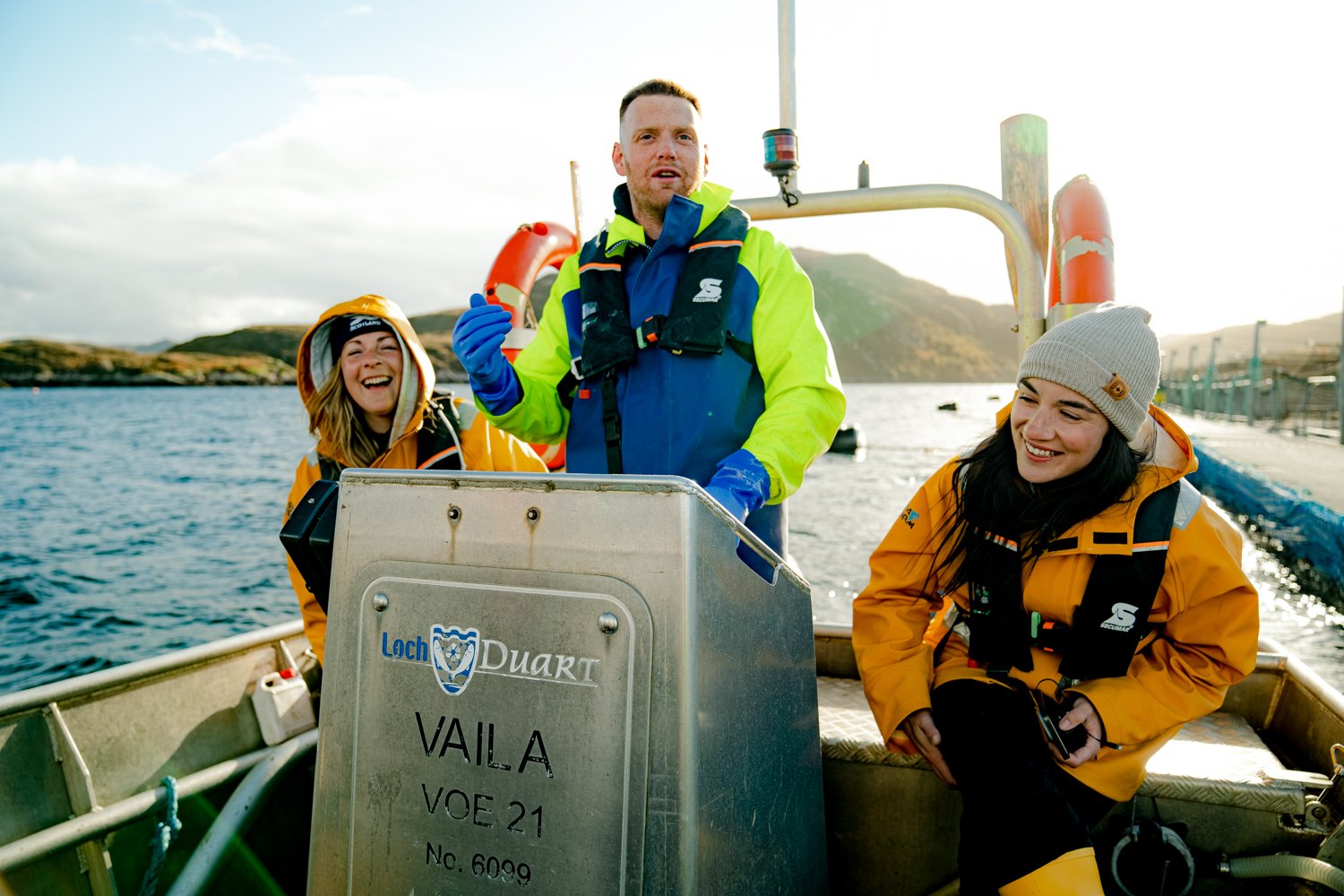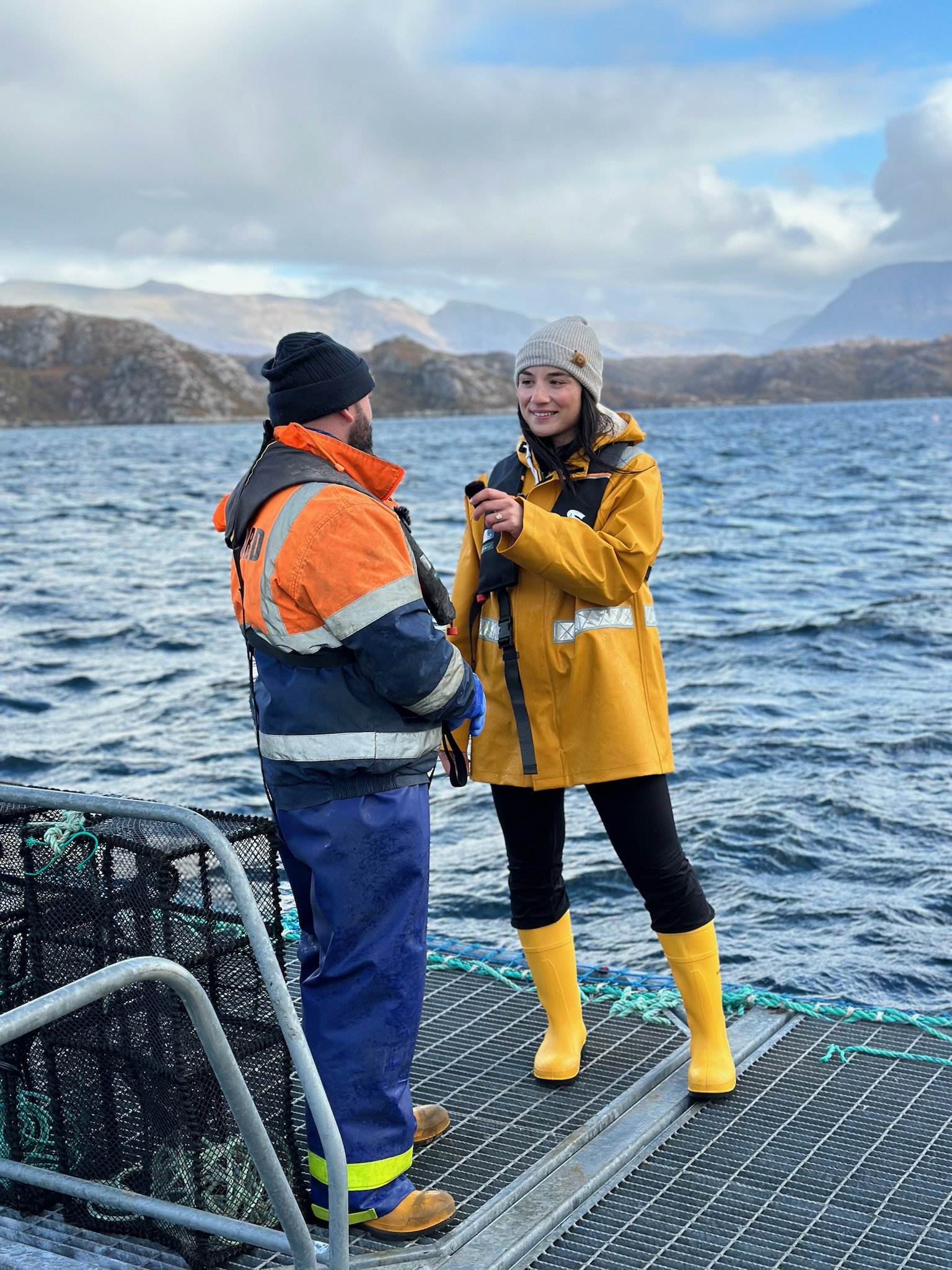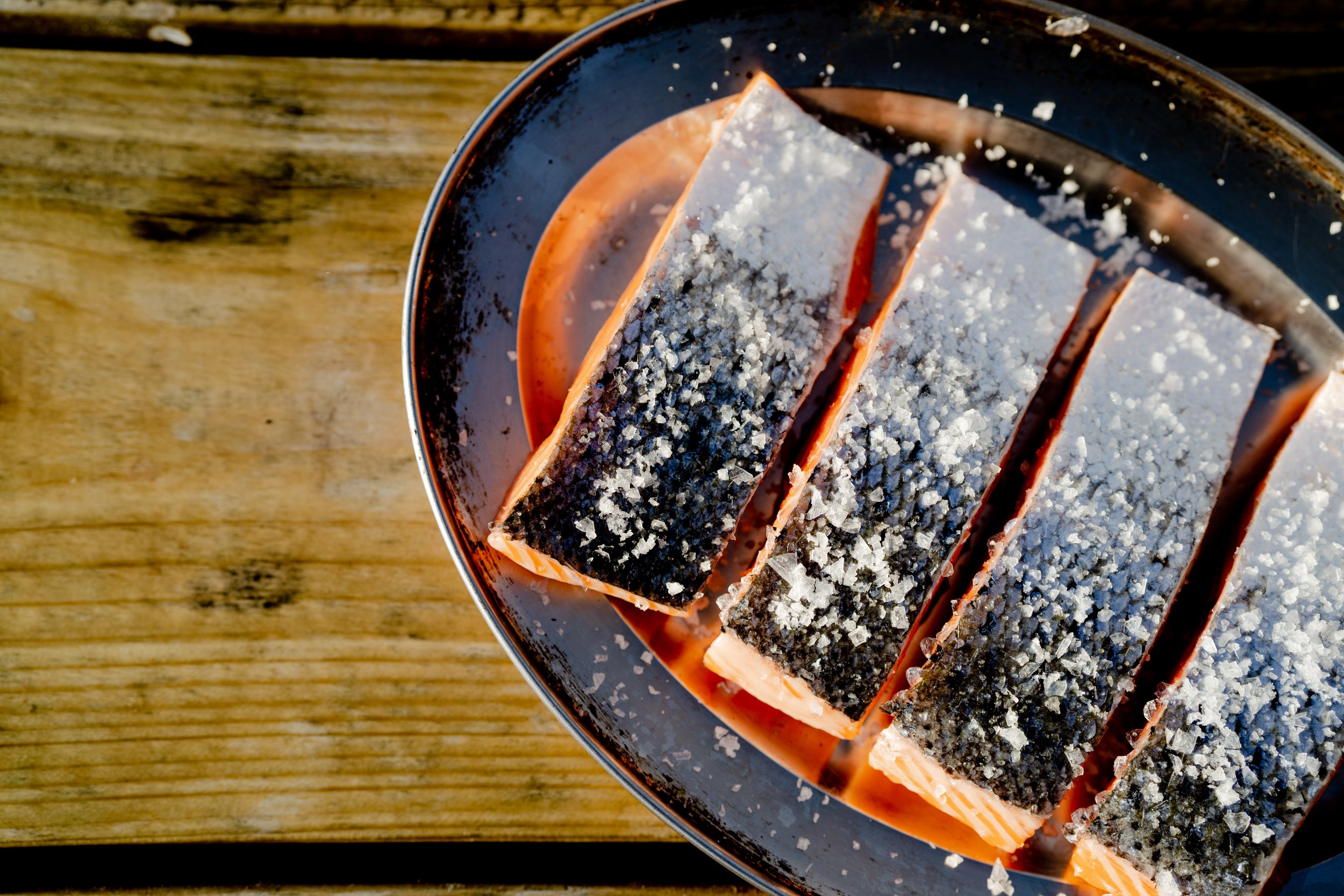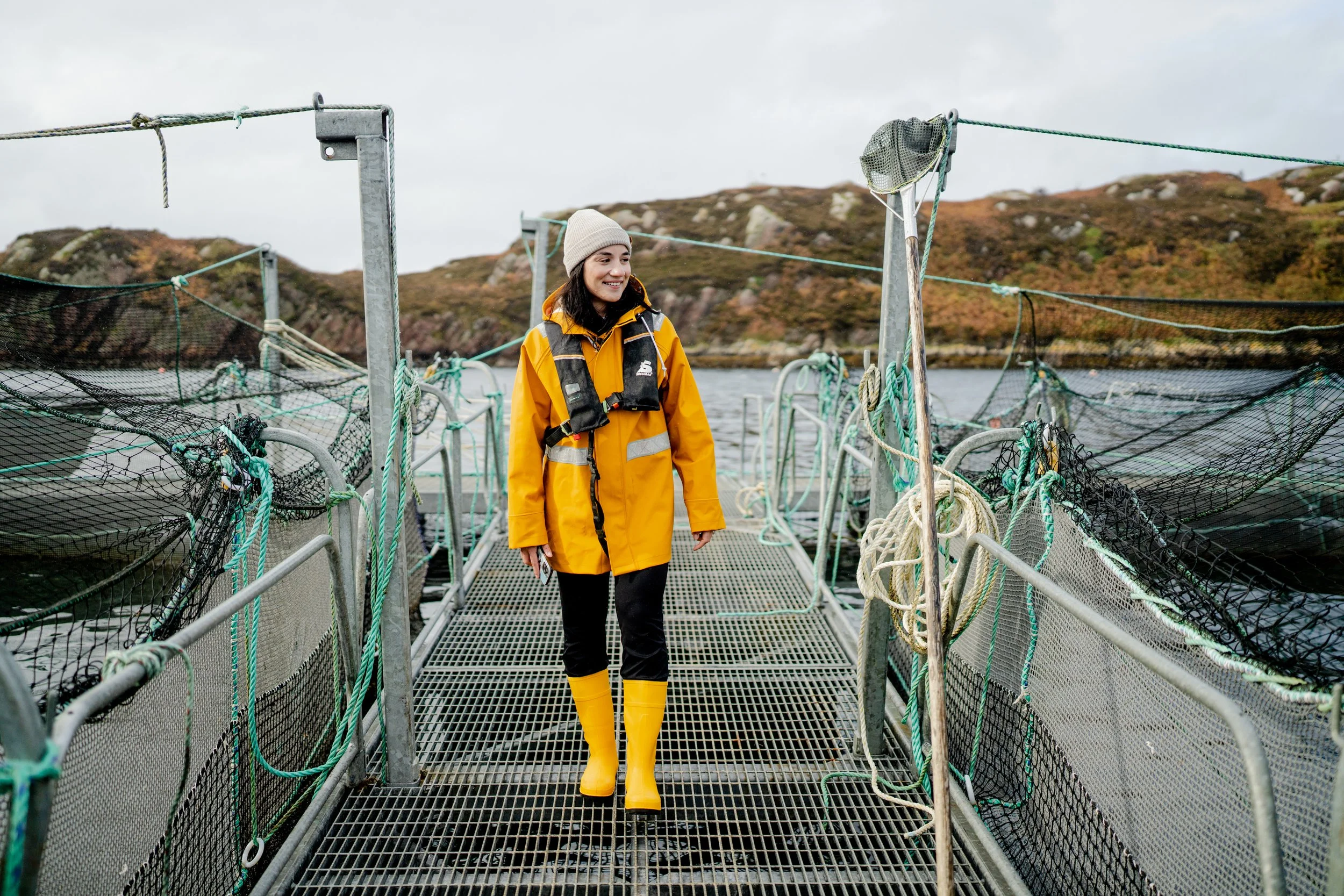A Journey Through the Scottish Highlands: Loch Duart, A World-Class Salmon Farm
An eight-hour flight to Glasgow.
A five-hour drive through the winding roads of the Highlands, past countless sheep and dramatic landscapes.
And then, finally, we arrived: Badcall Bay, the home of Loch Duart Salmon.
The air was crisp, the wind biting, and the landscape nothing short of breathtaking. Loch Duart is not just a salmon farm; it’s an independent, small-scale operation that has redefined what it means to farm sustainably. It was the perfect setting for a week of learning, storytelling, and uncovering the hard work that goes into producing some of the world’s best farmed salmon.
Day 1: First Impressions
Our journey to the Highlands was as rugged and wild as the Scottish terrain itself, but the team at Loch Duart welcomed us warmly. Despite the chill, damp air, their pride and passion for their work radiated like a warm shot of Scottish whiskey. Over coffee (we didn’t start with whiskey, I swear!), we began to learn what makes Loch Duart special.
Loch Duart’s philosophy is rooted in what they call “The Loch Duart Way.” It’s a commitment to small-scale farming, sustainable practices, and an unparalleled focus on the welfare of their salmon. It was clear from the moment we set foot into Loch Duart’s world, that this wasn’t going to be your typical aquaculture visit; it was clear we were in for something extraordinary.
Day 2: A Closer Look at the Loch Duart Way
The next morning, as the mist rolled across the highlands, we geared up for our first visit to the farms. Again, the day was damp and cold—quintessentially Scottish—but we all carried on with cheerful determination.
Their farms operate on a much smaller scale than the industry average, with an emphasis on low stocking densities—just 1.5% fish to 98.5% water. This ensures the salmon have ample space to swim freely, mimicking their natural environment. Loch Duart’s commitment to quality over quantity is evident in every decision they make, from the location of their farms in high-flow areas to the care they provide through natural husbandry techniques like freshwater baths and cleaner fish.
“It’s not the easy way,” their team admitted, “but it’s the right way.”
Day 3: The Science Behind Sustainability
Now, if you’ve been following me for a bit, you know one of the things that I like to nerd out about is aquaculture feed. So, for me, one of the most fascinating aspects of our visit was learning about Loch Duart’s feed strategy—a cornerstone of their approach to raising healthier, more sustainable salmon.
Loch Duart has worked with BioMar, one of the world leaders in sustainable aquaculture feed production, to develop a bespoke feed designed to closely mimic what salmon would naturally eat in the wild. This custom diet is rich in marine proteins and vitamins, providing the fish with the nutrients they need to thrive. The results are remarkable:
Higher Omega-3 Levels: Loch Duart salmon contain up to double the omega-3s of standard farmed salmon, making them a healthier choice for consumers.
Reduced Contaminants: By triple-cleaning their marine ingredients, Loch Duart has reduced dioxin levels in their feed by 67.5%, ensuring a cleaner, safer product.
Better Fish Health: The tailored feed supports the salmon’s natural fitness and resilience, reducing the need for antibiotics or artificial growth promoters.
This approach also has significant environmental benefits. Loch Duart uses feed made from MSC-certified fish trimmings—byproducts from the seafood industry that would otherwise go to waste (and byproducts from a sustainable fishery nonetheless!). This innovative practice not only reduces their reliance on wild fish stocks but also cuts their feed-related carbon footprint by 56.5%.
This commitment to sustainability extends all throughout their operation. Loch Duart was the first in Scotland to introduce hybrid feed barges, which have reduced diesel use by up to 60% per site. Their forage fish dependency ratio—a key metric in aquaculture sustainability—is one of the lowest in the industry at just 0.33, meaning their practices help protect wild fish populations while still delivering premium-quality salmon.
“Healthy feed, healthy salmon, healthy people,” as they say. And it was clear they meant it.
Day 4: Tasting the Loch Duart Difference
The highlight of the trip came at Scourie, a tiny village with a big culinary surprise: The Crofters Kitchen. Here, we joined Chef Grant to taste the fruits of Loch Duart’s labor.
As the salmon dishes arrived—pan-seared fillets, delicate ceviche, and my personal favourite, fish tacos—we could see and taste the results of Loch Duart’s meticulous efforts. The fish was firm, rich, and vibrant, with a flavor that truly embodied the Highland waters it came from.
“When you taste salmon like this,” Chef Grant said, “you realize the difference that care and sustainability make. It’s a product chefs respect and love to work with.”
Reflections on the Loch Duart Experience
Standing at the Upper Badcall viewpoint on our final day, overlooking the vast expanse of lochs and mountains, I felt an overwhelming sense of gratitude. This wasn’t just a professional work trip—it was a deeply personal reminder of why I do what I do.
Food has always been more than just sustenance for me. It’s culture. It’s community. It’s history. Thoughtfully producing good food—food with integrity—is one of the greatest acts of care we can offer to each other and to the world. Loch Duart embodies that care in every detail of their work, and being here was a chance to witness it firsthand.
Loch Duart is more than a salmon farm. It’s a living testament to what’s possible when sustainability, ethics, and excellence are at the forefront of food production. Their commitment to small-scale, high-quality farming doesn’t just redefine aquaculture; it challenges the broader food system to rethink its priorities.
What stood out to me most was how every decision Loch Duart makes is grounded in the understanding that good food starts with good practices. From the genetics of their salmon to their bespoke feed, to their low-impact farming methods, everything is intentional and deeply rooted in a respect for the environment, the fish, and the people who enjoy their product.
For me, this journey reinforced why I’m so passionate about seafood—wild or farmed. It’s never just about the fish; it’s about the people, the processes, and the stories behind every bite. It’s about finding ways to bridge food culture and sustainability, ensuring that the choices we make honor both the planet and the traditions that shape us.
At Loch Duart, every detail tells a story worth celebrating—a story of passion, dedication, and the belief that good food has the power to connect us all. And that’s a story I’ll never stop telling.
Photos courtesy of Bri Dwyer.









